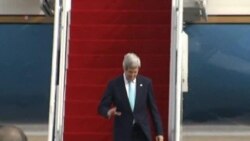U.S. Secretary of State John Kerry has started a tour of Asia, where he plans to push North Korea to give up its nuclear ambitions and China to reduce regional tensions.
The trip is Kerry's fifth visit to Asia since becoming the top U.S. diplomat last year. It includes stops in South Korea on Thursday, China on Friday, and Indonesia on Saturday.
After arriving in Seoul, Kerry said military exercises with South Korea this month will be the same as drills that have been held over the years and North Korea should not link them with reunions of separated Korean families.
North Korea, which says the exercises are a rehearsal for war, demanded in rare talks with South Korean officials on Wednesday that the drills be postponed so that they do not overlap with the planned reunion of families separated since the 1950-53 Korean War.
"The United States doesn't believe it is appropriate to link humanitarian issues such as [family] reunification to any other issues,'' Kerry told a news conference with his South Korean counterpart when asked about the North's demand on the drills.
Earlier on Thursday, South Korea said it had rejected North Korea's demand to postpone the exercises, which had raised the possibility that the family reunions might get scrapped.
The drills have also complicated U.S. efforts to win freedom for Korean-American Kenneth Bae, who is detained in a North Korean labor camp.
Pyongyang has twice withdrawn an invitation for a senior U.S. diplomat to visit and negotiate the release of the Christian missionary.
Sea disputes
Washington has been critical of what it sees as China's attempts to gain control over contested parts of the East and South China Seas.
Ahead of Kerry's arrival in Seoul, a U.S. official said it is "unwise in the extreme for China," to take disruptive and destabilizing actions. The official warned Beijing should "do nothing to upend the status quo."
The Obama administration last week called on China to clarify or amend its vast maritime claims, suggesting they may be inconsistent with international law.
Kerry also is expected to encourage Beijing to put more pressure on its ally North Korea to scale back its nuclear weapons program.
Climate change
In Indonesia, the last leg of Kerry's trip, climate change is expected to be a major focus. He is expected to deliver a major speech on climate change in the archipelago nation, which analysts have said is especially vulnerable to climate change.
From Jakarta, Kerry will head Monday to the United Arab Emirates to meet Gulf leaders on Iran nuclear talks, Syria's civil war, and Middle East peace talks.
Some have accused the White House of focusing on the Middle East at the expense of its so-called economic and military "pivot" to Asia.
Some information for this report provided by Reuters
The trip is Kerry's fifth visit to Asia since becoming the top U.S. diplomat last year. It includes stops in South Korea on Thursday, China on Friday, and Indonesia on Saturday.
After arriving in Seoul, Kerry said military exercises with South Korea this month will be the same as drills that have been held over the years and North Korea should not link them with reunions of separated Korean families.
North Korea, which says the exercises are a rehearsal for war, demanded in rare talks with South Korean officials on Wednesday that the drills be postponed so that they do not overlap with the planned reunion of families separated since the 1950-53 Korean War.
"The United States doesn't believe it is appropriate to link humanitarian issues such as [family] reunification to any other issues,'' Kerry told a news conference with his South Korean counterpart when asked about the North's demand on the drills.
Earlier on Thursday, South Korea said it had rejected North Korea's demand to postpone the exercises, which had raised the possibility that the family reunions might get scrapped.
The drills have also complicated U.S. efforts to win freedom for Korean-American Kenneth Bae, who is detained in a North Korean labor camp.
Pyongyang has twice withdrawn an invitation for a senior U.S. diplomat to visit and negotiate the release of the Christian missionary.
Sea disputes
Washington has been critical of what it sees as China's attempts to gain control over contested parts of the East and South China Seas.
Ahead of Kerry's arrival in Seoul, a U.S. official said it is "unwise in the extreme for China," to take disruptive and destabilizing actions. The official warned Beijing should "do nothing to upend the status quo."
The Obama administration last week called on China to clarify or amend its vast maritime claims, suggesting they may be inconsistent with international law.
Kerry also is expected to encourage Beijing to put more pressure on its ally North Korea to scale back its nuclear weapons program.
Climate change
In Indonesia, the last leg of Kerry's trip, climate change is expected to be a major focus. He is expected to deliver a major speech on climate change in the archipelago nation, which analysts have said is especially vulnerable to climate change.
From Jakarta, Kerry will head Monday to the United Arab Emirates to meet Gulf leaders on Iran nuclear talks, Syria's civil war, and Middle East peace talks.
Some have accused the White House of focusing on the Middle East at the expense of its so-called economic and military "pivot" to Asia.
Some information for this report provided by Reuters






